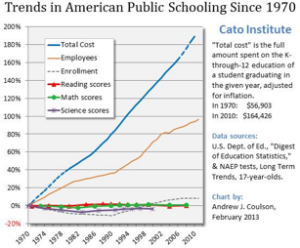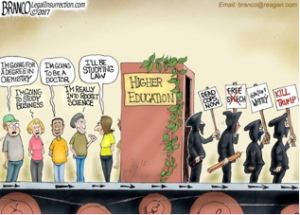Want to live in a healthy and wealthy manner in the future? You’ll need to wise up!
The human mind is the source of all values, progress, achievement, and flourishing. But our minds do not function automatically. They must be educated, imaginative, innovative, inspired, and introspective.
This has never been truer than now, because exponential technologies in information, nanotech, biotech, robotics, and AI promise a future of unimaginable prosperity with longer, healthier lives for all. Technology will radically transform and drive the economy, society, social institutions, and culture in coming decades. But only educated and trained minds can create and reap the benefits of this future.
Sadly, the schooling system in the United States—and in many other countries—has failed students for decades. Singularity University co-founder Peter Diamandis rightly observes that the current system is “Baroque and broken.”
We need to launch an education revolution!
Failing Students
 The current system, mostly run or dominated by governments, is a remnant of the nineteenth century Industrial Revolution’s mass production model. At 9:00 am math is poured into students’ heads; at 10:00 am kids are moved down the assembly line for an injection of reading, and so on. This system provided the basics needed for a productive citizenry in the industrializing world in the past, but it does not reflect the very individualized ways children actually learn.
The current system, mostly run or dominated by governments, is a remnant of the nineteenth century Industrial Revolution’s mass production model. At 9:00 am math is poured into students’ heads; at 10:00 am kids are moved down the assembly line for an injection of reading, and so on. This system provided the basics needed for a productive citizenry in the industrializing world in the past, but it does not reflect the very individualized ways children actually learn.
Even with recent attempts to improve teaching, most schools still use a one-size-fits-all “sage on a stage” approach, lecturing students who are often either bored because the lessons are too simple or lost because they are too difficult.
Inflation-adjusted education spending has increased some 200 percent since 1970. Yet scores on standardized tests have flatlined. Colleges must devote resources for remedial education to make up for the failures of K-12 schools. As imperfect as international comparisons can be, it is still alarming that American students often score low on math and even science compared to students in other countries.
The victims who suffer most from schooling failures are students in poorer neighborhoods and inner cities. In Baltimore, for example, in 2018 there were thirteen high schools with zero students rated proficient in math. One high school student passed only three classes in four years yet was in the top half of his class, always promoted to higher grades, as the principal of that school drew nearly an annual salary of $200,000.
Failing the Future Economy
A clear indication of the schooling failure is a major institutional disconnect. On the one hand are the needs of businesses for workers with requisite skills—especially in exponential tech—and of individuals for fulfilling, remunerative careers. On the other hand are the government-dominated schools, that fail to fulfill these needs. Before the 2020 pandemic, there were 1.6 million more job openings than unemployed Americans because of those failures.
In our exponential technology future, there will be a growing demand for individuals whose education is tied to market needs and who, in addition, are innovative and entrepreneurial. Yet market needs will not be satisfied because there’s no true free market in education. This is because customers—parents who want the best education for their children—have little or no choice about where and how their money is spent on their children’s education.
Destroying the Mind
As bad as K-12 education is, there is an even-more serious problem with higher education.
Many American universities and colleges still provide world-class science and technological education and research. And there are pockets of fine scholarship as well. But skyrocketing tuition costs, combined with and caused by government-backed loans and often useless classes, have saddled many graduates with debt, worthless degrees, and resentment.
 Worse, American higher education is now dominated by dogmas that attack the foundations of civilization and education, the human mind, and the Enlightenment values of reason, individualism and open inquiry. So-called “post-modernism” even rejects the very notion of objective reality. We see professors claiming algebra and geometry perpetuate racism and that academic rigor enforces “white male heterosexual privilege.” Rather than being bastions of free thought, they’ve become major purveyors of the “cancel culture,” imposing heavy-handed censorship on even the mildest departures from leftist dogmas.
Worse, American higher education is now dominated by dogmas that attack the foundations of civilization and education, the human mind, and the Enlightenment values of reason, individualism and open inquiry. So-called “post-modernism” even rejects the very notion of objective reality. We see professors claiming algebra and geometry perpetuate racism and that academic rigor enforces “white male heterosexual privilege.” Rather than being bastions of free thought, they’ve become major purveyors of the “cancel culture,” imposing heavy-handed censorship on even the mildest departures from leftist dogmas.
For several decades higher education has turned out graduates who now dominate media, entertainment, civic organizations, religion, charities, corporate boards, politics and, of course, schooling. And civilization cannot survive many more generations if this mind-eating moral virus continues.
A Path to an Education Revolution
The 2020 COVID-19 pandemic, during which American students connected with teachers remotely, has led to much-needed deep questions about the current schooling system. Just as we’ve had an information and communications revolution, and just as we see the emerging bio-tech, nano-tech, robotics and AI revolutions, so we need an education revolution led by education entrepreneurs!
Unleashing Education Entrepreneurship
Certain insights can light the way for this revolution.
- Education choice is obviously essential. Only if parents rather than government officials allocate the money for their children’s education, and only if entrepreneurs are allowed to compete for those dollars by offering innovative services, will we see the education equivalent of the information and communications revolution.
- Education and training ultimately are about learning how to think. And thinking is about the real world, about evaluating information, analyzing different aspects of an issue, and challenging oneself to be as reality-oriented and truth-committed as possible. The Socratic method will be especially important for training in thinking about the dynamic, synergistic relationship between technology, social institutions, and public policy.
- Educating for the future will require a basic knowledge of the exponential technologies in information and communications, bio-tech, nano-tech, robotic and AI that are driving it. This will be essential for living in that world and for vanquishing fears of robots taking jobs, AIs ruling us, gene editing creating a “bio-divide” like the ‘90s-feared “digital divide” or a soulless Master Race.
- Educators should appreciate the opportunities provided by apprenticeships to supplement or even supplant higher education. These are “learn and earn” programs that are “job tryouts.” Students in high school might spend part of the day in classrooms and the rest at a workplace, in professions as diverse as plumbing, carpentry, financial services, pharmaceutical work, and various form of technology. And in so doing, apprentices accumulate savings rather than debts. Some 70 percent of Swiss kids go through such apprenticeships.
- Many major companies no longer demand four-year college degrees as a requirement for employment, just proof that an employee can do the job. This opens up a market for alternative means of training and certification.
- With fast-changing technology and, thanks to bio-tech breakthroughs, individuals living healthily past 100, individuals likely will change professions in mid-career. Life-long education will be the wave of the future. The current unemployment insurance system will need to be restructured from simply offering handouts to individuals who lose jobs to one allowing individuals to use the money currently taken from their paychecks for that insurance system to be used for retraining or continuing education subscription services.
The Beautiful Minds
Children are naturally curious and creative, and they need training and education that allows them to realize their personal dreams and full potential. The fast-moving future of exponential technology will require individuals with fast-moving, entrepreneurial minds.
An education revolution will have a crucial cultural impact. It will replace today’s pessimism, nihilism, anger, despair, and malevolence with optimism, purpose, joy in achievement, and confidence, which can create a benevolent future of prosperity and long, healthy, fulfilling lives for all.
———–
 Edward Hudgins, PhD, ([email protected]) is founder of the Human Achievement Alliance. He has a decades-long in free-market public policy, with a specialty in science and technology, and promoting the values of reason and individualism.
Edward Hudgins, PhD, ([email protected]) is founder of the Human Achievement Alliance. He has a decades-long in free-market public policy, with a specialty in science and technology, and promoting the values of reason and individualism.

